Unit 2学霸笔记
Unit2笔记
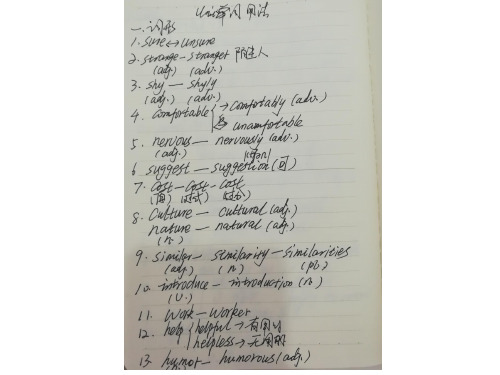
1. I could hear loud music and people talking as I walked through the door.
2. Then I nervously stood in a corner, not quite sure what to do.
3. Then there was a long silence as I kept trying to think about what to say next.
himself or herself, or talk about something you both like such as football or pop music
1.打破沉默
1. break the ice
2.消磨时光
2. pass the time
3.填补那些时光的一种方法 3. a way of filling those periods
4. 排队等候
4. wait in line
5.交流的一种普遍形式 5. a common form of communication
6.结婚
6. be/get married
7 商务旅行者
7. business travelers
8.服务顾客
8. serve customers
9. 私人话题
9. private subjects
You’re not ready, are you? 你没有准备好,是吧? Yes, I am. 不,我准备好了。 No, I’m not. 是的,我没有。
反意疑问句
1.The train is always late, isn’t it? 2.You’re Tim’s cousin, aren’t you? 3.It’s very nice, isn’t it? 4.The school’s very big, isn’t it? 5.It always rains on the weekend, doesn’t it? 6.You just started yesterday, didn’t you? 7.You have an elder sister, ____ ______? 8.You love violin music, don’t you? 9.It looks like rain, doesn’t it? 10.You haven’t met your teachers yet, _____ _____?
英语Unit2笔记整理
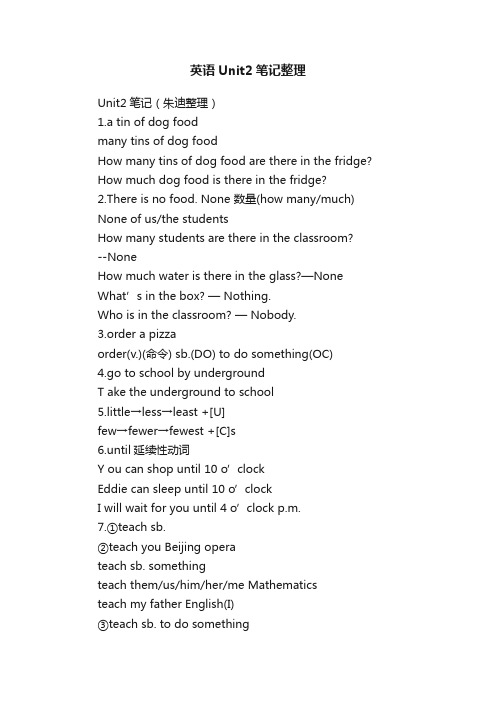
英语Unit2笔记整理Unit2笔记(朱迪整理)1.a tin of dog foodmany tins of dog foodHow many tins of dog food are there in the fridge? How much dog food is there in the fridge?2.There is no food. None 数量(how many/much) None of us/the studentsHow many students are there in the classroom?--NoneHow much water is there in the glass?—None What’s in the box? — Nothing.Who is in the classroom? — Nobody.3.order a pizzaorder(v.)(命令) sb.(DO) to do something(OC)4.go to school by undergroundT ake the underground to school5.little→less→least +[U]few→fewer→fewest +[C]s6.until延续性动词Y ou can shop until 10 o’clockEddie can sleep until 10 o’clockI will wait for you until 4 o’clock p.m.7.①teach sb.②teach you Beijing operateach sb. somethingteach them/us/him/her/me Mathematicsteach my father English(I)③teach sb. to do somethingCan teach me to swim?④teach sb. how to do somethingCan you teach me how to make cakes?8.It’s+time+f rom A to B +transportIt’s twenty minutes from my home to my school on foot.How long is it from my home to my school on foot?How far is it from my hone to my school on foot? It’s twenty minutes’ walk from my home tomy school.It’s +路程+ from A to B.It’s + distance + from A to B.It takes sb. time + to do something.It takes me twenty minutes to walkfrom…to….How long does it take me to walkfrom…to…?It’s three hours from Beijing to Shanghaiby plane/air.①How long is it from Beijing to Shanghaiby plane/air?②How far is it from Beijing to Shanghai byplane/air?It takes three hours to take a plane fromBeijing to Shanghai.It’s ten minutes from the centre of the cityto my home by bike.It’s ten minutes’ ride from the centre of thecity to my home.How far is it from the centre of the city tomy home?It takes me ten minutes to ride a bike fromthe centre of the city to my home.9.There be + more/least/fewer + n. + sp.than + sp.There is more land in Shanghai than in Changzhou.There are fewer people in Shanghai thanin Shanghai.There are fewer books in our library thanin their library.There is less water in the bottle than inthat bottle.10.most ①pron.不定代词most of usmost of the students/souvenirs②adj. +名词most buildingspron. Most of the water in the river isdirty.11.don’t have/need to do something=needn’t 不需要Y ou don’t have to take the umbrella with you.Y ou needn’t take the umbrella with you.Y ou needn’t cross the road to go to the post office. have to do something 客观He has to do so much work.Her son is ill/sick. She has to look after him.must 主观I want to get high works. I must work hard.Must I finish all the work now?--Y es, you must./No, you needn’t/don’t have to.12.(2)until 直到…为止①prep + timeMy mother always shops until 9:00 at night on Sundays.He works until eight o’clock in the office every day.I will stay here until noon.not…until 直到…才I can’t play basketball until five p.m. Sandy won’t arrive until 6:00.I didn’t go to bed until 10 last night.Eddie doesn’t do his homewor k until 7:00 yesterday evening.②conj.I will wait for you(主将)until you come here.(从现)They won’t go home until their parents take them home.They didn’t go home(主过) until they finished cleaning the class(从过).I can’t play outside until I finish my homework.13.look for findHe looked for a job, at least he found a well-paid job.14.A is + time + away from B + transport. It’s fifteen minutes away from my school by bus.My home is two kilometres away from my schoolHer dog Eddie is sick/ill.15.sick/illa sick dogan ill dog ill作定语,意思是品行不良的。
译林版六年级下册英语unit2课堂笔记
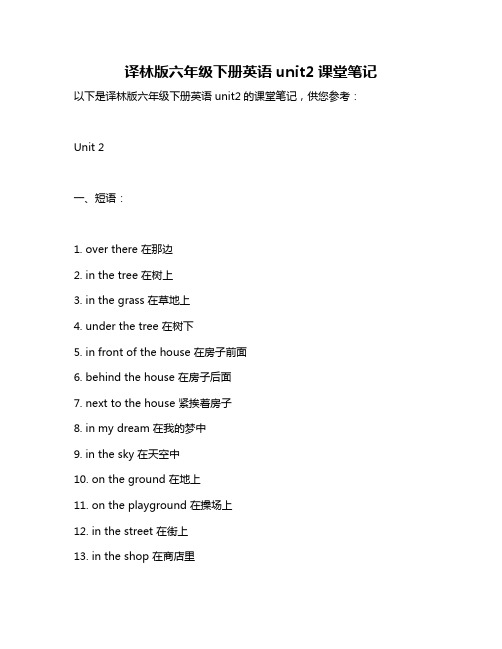
译林版六年级下册英语unit2课堂笔记以下是译林版六年级下册英语unit2的课堂笔记,供您参考:Unit 2一、短语:1. over there 在那边2. in the tree 在树上3. in the grass 在草地上4. under the tree 在树下5. in front of the house 在房子前面6. behind the house 在房子后面7. next to the house 紧挨着房子8. in my dream 在我的梦中9. in the sky 在天空中10. on the ground 在地上11. on the playground 在操场上12. in the street 在街上13. in the shop 在商店里14. in the supermarket 在超市里15. in the museum 在博物馆里16. at the bus stop 在公交车站17. at the train station 在火车站18. at the airport 在机场19. in the countryside 在乡下20. in the mountains 在山里21. in the sea 在海里22. in the sky 在空中23. in space 在太空中24. at night 在晚上25. in the morning 在早上26. in the afternoon 在下午27. at noon 在中午28. last night 昨晚29. this morning 今天早上30. this afternoon 今天下午31. this evening 今天晚上32. yesterday 昨天33. today 今天34. now 现在35. before 在……之前36. after 在……之后37. with 和……一起,用……(表方法)38. with a pen 用一支钢笔(表工具)39. with my friends 和我的朋友们(表伴随)40. with a smile 带着微笑(表伴随)。
6BU2学霸笔记(易错易混知识点+经典例题) 译林版三起
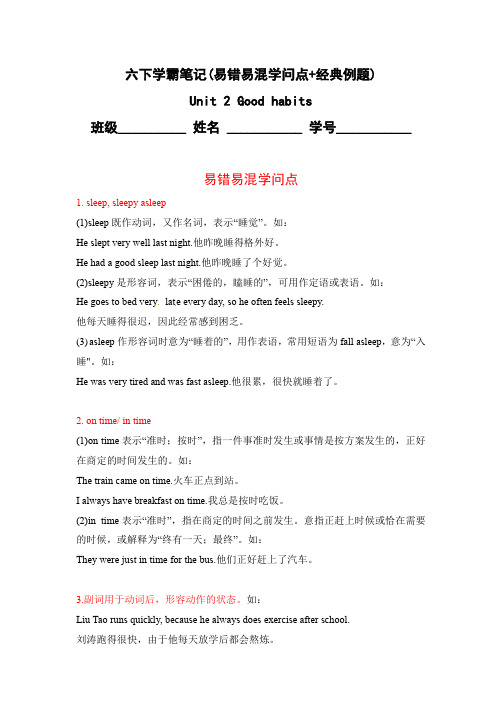
六下学霸笔记(易错易混学问点+经典例题)Unit 2 Good habits班级__________ 姓名 ___________ 学号___________易错易混学问点1. sleep, sleepy asleep(1)sleep既作动词,又作名词,表示“睡觉”。
如:He slept very well last night.他昨晚睡得格外好。
He had a good sleep last night.他昨晚睡了个好觉。
(2)sleepy是形容词,表示“困倦的,瞌睡的”,可用作定语或表语。
如:He goes to bed very late every day, so he often feels sleepy.他每天睡得很迟,因此经常感到困乏。
(3)asleep作形容词时意为“睡着的”,用作表语,常用短语为fall asleep,意为“入睡"。
如:He was very tired and was fast asleep.他很累,很快就睡着了。
2. on time/ in time(1)on time表示“准时;按时”,指一件事准时发生或事情是按方案发生的,正好在商定的时间发生的。
如:The train came on time.火车正点到站。
I always have breakfast on time.我总是按时吃饭。
(2)in time表示“准时”,指在商定的时间之前发生。
意指正赶上时候或恰在需要的时候,或解释为“终有一天;最终”。
如:They were just in time for the bus.他们正好赶上了汽车。
3.副词用于动词后,形容动作的状态。
如:Liu Tao runs quickly, because he always does exercise after school.刘涛跑得很快,由于他每天放学后都会熬炼。
He speaks Chinese well. 他中文讲的好。
初一英语unit2笔记
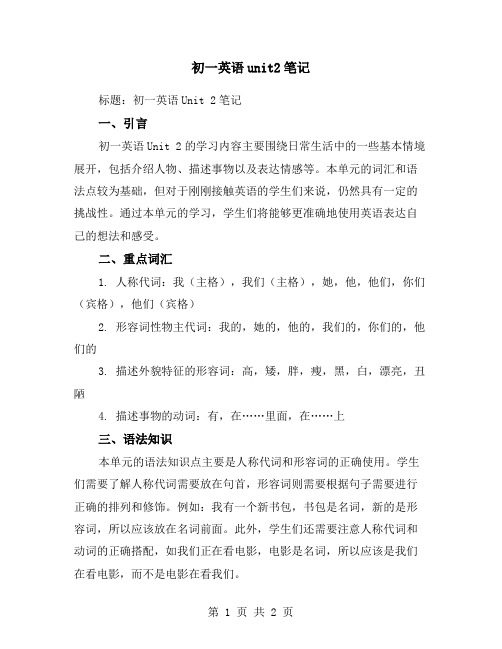
初一英语unit2笔记标题:初一英语Unit 2笔记一、引言初一英语Unit 2的学习内容主要围绕日常生活中的一些基本情境展开,包括介绍人物、描述事物以及表达情感等。
本单元的词汇和语法点较为基础,但对于刚刚接触英语的学生们来说,仍然具有一定的挑战性。
通过本单元的学习,学生们将能够更准确地使用英语表达自己的想法和感受。
二、重点词汇1. 人称代词:我(主格),我们(主格),她,他,他们,你们(宾格),他们(宾格)2. 形容词性物主代词:我的,她的,他的,我们的,你们的,他们的3. 描述外貌特征的形容词:高,矮,胖,瘦,黑,白,漂亮,丑陋4. 描述事物的动词:有,在……里面,在……上三、语法知识本单元的语法知识点主要是人称代词和形容词的正确使用。
学生们需要了解人称代词需要放在句首,形容词则需要根据句子需要进行正确的排列和修饰。
例如:我有一个新书包,书包是名词,新的是形容词,所以应该放在名词前面。
此外,学生们还需要注意人称代词和动词的正确搭配,如我们正在看电影,电影是名词,所以应该是我们在看电影,而不是电影在看我们。
四、笔记整理为了更好地理解和记忆所学内容,学生们应该将重点词汇和语法知识点整理到笔记中。
例如:1. 人称代词+动词短语:我是学生,我们是朋友。
2. 形容词+名词:他的名字叫小明,我的书包是新的。
3. 人称代词+介词+名词:我在教室里面看书,他们在桌子上放了一个新玩具。
4. 人称代词+动词(主语+谓语+宾语)结构:你们吃了吗?他们在看电影。
五、练习与反馈在掌握了重点词汇和语法知识后,学生们需要进行相关的练习来巩固所学内容。
例如:可以找同学或朋友进行对话练习,用所学知识进行简单的交流。
同时,学生们也要及时反馈自己的学习情况,找出自己的不足之处并加以改进。
六、结语初一英语Unit 2的学习内容虽然基础,但对于学生们来说仍然具有一定的挑战性。
通过认真听讲、积极练习和及时反馈,学生们可以更好地理解和掌握所学知识,为以后的英语学习打下坚实的基础。
初三上册Unit2笔记
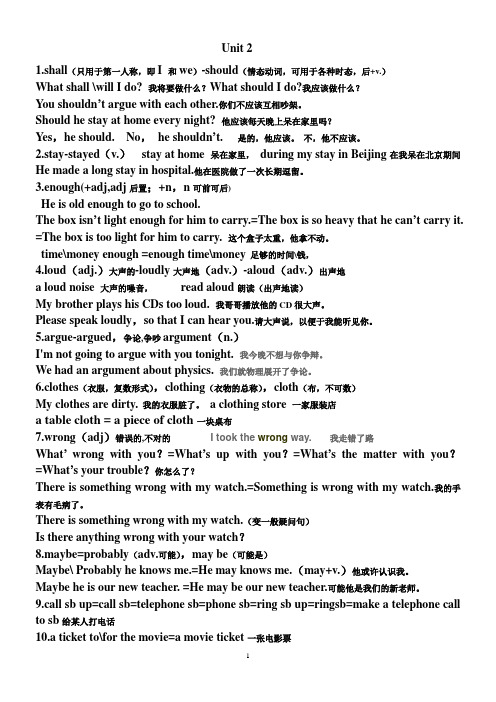
Unit 21.shall(只用于第一人称,即I 和we)-should(情态动词,可用于各种时态,后+v.)What shall \will I do? 我将要做什么?What should I do?我应该做什么?You shouldn’t argue with each other.你们不应该互相吵架。
Should he stay at home every night? 他应该每天晚上呆在家里吗?Yes,he should. No,he shouldn’t. 是的,他应该。
不,他不应该。
2.stay-stayed(v.)stay at home 呆在家里,during my stay in Beijing在我呆在北京期间He made a long stay in hospital.他在医院做了一次长期逗留。
3.enough(+adj,adj后置;+n,n可前可后)He is old enough to go to school.The box isn’t light enough for him to carry.=The box is so heavy that he can’t carry it. =The box is too light for him to carry. 这个盒子太重,他拿不动。
time\money enough =enough time\money足够的时间\钱,4.loud(adj.)大声的-loudly大声地(adv.)-aloud(adv.)出声地a loud noise 大声的噪音,read aloud朗读(出声地读)My brother plays his CDs too loud. 我哥哥播放他的CD很大声。
Please speak loudly,so that I can hear you.请大声说,以便于我能听见你。
5.argue-argued,争论,争吵argument(n.)I'm not going to argue with you tonight. 我今晚不想与你争辩。
Unit2笔记人教版八年级上册英语
八年级上学期英语笔记(2)Unit 2 How often do you exercise?I. Important phrases.hardly ever 几乎从不swing dance 摇摆舞how often 多久一次once a week 每周一次twice a week 每周两次be full/free 忙的/有空surf/ use the Internet 上网How e?为什么? at least 至少,不少于at most 最多junk food 垃圾食品such as 例如more than 多于less than 少于stay up 熬夜help with sth帮助某事play sports 做运动on weekends 在周末go to the movies 看电影play puter games 玩电子游戏watch TV 看电视use the Internet 上网go to the dentist 去看牙医go shopping 去购物the most popular 最受欢迎的three times a month每月三次not......at all 一点也不have......lessons 上......课in one’s free time 在某人的空闲时间II. Grammar 频度副词1) 含义:一般用来表示动作发生的频率。
2) 一般来说可按频率大小排列为:(总是)always ﹥(通常) usually﹥(经常) often﹥(有时)sometimes﹥(几乎从不)hardly ever ﹥(从不) never3) 频度副词放在系动词、助动词或情态动词之后,行为动词之前。
eg. I never go shopping.4) 构成频率的表达方式:1. 次数(once/ twice/three times/...)+ a +时间(day/week/month/year/...)2. 次数+ every﹢基数词+时间eg. twice every three weeks once every two years3. every +时间(day,week, month, year...)4. 频度副词对以上四点提问时,一般用how often(多久一次)。
九年级上册英语unit2笔记
九年级上册英语Unit2重点笔记
哎哟喂,这九年级上册英语Unit2,咱们得好好捋捋哈。
说起这单元,重点可是多如牛毛,但咱不慌,一步步来。
首先得搞定那些个新单词,像“tradition”传统啊,“celebrate”庆祝嘞,还有“relative”亲戚们,都得熟门熟路,见面能打招呼那种。
记单词嘛,得有点儿窍门,联想法、词根词缀法,啥好用使啥,别跟背天书似的。
再来说说语法,这单元讲的是“used to do”过去常常做某事,跟“be used to doing”习惯于做某事,俩兄弟长得挺像,但意思差老鼻子了。
你得分清楚,不然写出来的东西,人家一读,嘿,味儿不对!
阅读部分,那文章讲的是世界各地的节日,比如“Mid-Autumn Festival”中秋节,得理解它背后的文化含义,还有那“Thanksgiving Day”感恩节,人家为啥感恩,你得知道个大概,这样读起来才有味儿。
听力也别落下,多听听那些地道的发音,特别是连读、弱读那些小技巧,耳朵磨磨就习惯了。
还有啊,口语练习也别偷懒,跟同学多用英语聊聊节日,练练“How do you celebrate...?”这样的句子,说出来才流利。
最后,别忘了做做题,巩固巩固。
错题集得建起来,哪儿不会补哪儿,别让它成了你的“拖油瓶”。
总之啊,九年级上册英语Unit2,就是得用心学,多听多说多读多写,功夫下到了,自然水到渠成。
加油嘞,孩子们!。
八年级上册英语unit2笔记
八年级上册英语unit2笔记一、重点词汇和短语1. 掌握单词:learn、about、borrow、lend、keep、read、book、bag、thank、sorry、return2. 短语:借书、还书、借……书、借……还……、谢谢、抱歉、保持……状态二、语法知识本单元主要学习一般现在时的用法,包括动词的第三人称单数形式和现在分词形式,以及be动词的用法。
同时,也涉及到一些常用的句型和短语。
三、重点句型和对话1. 重点句型:What can I do for you? What’s wr ong with your book? Could you lend me your book? I’m sorry, I can’t return it on time. Here you are. Thank you.2. 对话示例:同学A:Can I borrow your English book?同学B:Sure, here you are.同学A:Thank you very much.同学B:You’re welcome. Don’t forget to return it on time.四、课文理解和分析本单元的课文主要讲述了两名同学借书的情景,通过对话形式表达了借书还书的常用语和礼貌用语。
在理解和分析课文时,要注意把握人物的语言和动作,理解其中的情感和意义。
五、作业指导和建议1. 作业:根据本单元所学知识,完成相关练习题和作业题,加强理解和应用。
2. 建议:在日常生活中多加练习,注意语言的准确性和得体性。
同时,要善于总结和反思,不断加强自己的语言表达能力。
六、拓展阅读和推荐1. 推荐阅读书目:《书虫》系列英语读物,其中包含八年级上册英语相关的阅读材料,有助于进一步提高阅读能力。
2. 拓展知识:查阅相关资料,了解图书馆借书系统的使用方法,以及图书馆的历史和发展。
七、常见错误分析和注意事项1. 常见错误:在应用本单元所学知识进行实际操作时,往往会因为语言的不准确或不得体而出现错误。
七年级英语Unit 2 课堂笔记
t_w__o_p__h_o_t_o_s_o_f__m__y_f_a_m__i_ly_
11. 在第一/下张照片中
i_n__t_h_e_f_i_r_s_t_/_n_e_x_t_p_h__o_t_o__ 12. 狗的名字 _t_h_e__n_a_m__e_o__f_t_h_e_d__o_g_
There are(有) XX people in my family. They are my XX, my XX, my XX and me.
注意: ★ 当介绍多个人或物时,通常只在后两个人或物之间加 and, 前面的人或物之间用“,” 隔开。
1、parents是parent的复数形式,表示父母双亲。parent表示父母 双亲中的一员——father或mother。类似的词还有grandparent, 意为“祖父(母);外祖父(母)”。
3. 这是我的兄弟们。
T__h_e_se_ _a_r_e_ my brothers.
4. 那是我的父母亲。
T__h_o_s_e __a_r_e_ my parents.
5. 她是谁?_W__h_o_’s_ she? 6. 她是我的妹妹。
She’s my _s_is_t_e_r_.
7. 8.
他他是是谁我?的W弟___弟h_o_。’_s
(3)表结果。 例句:He felt terrible and went home.
他觉得难受,所以回家了。
(4)表连续。 例句: It is getting colder and colder.
现在天气越来越冷了。
语重点三:
名词所有格
名词的所有格 :表示所属关系,即表示某物是“谁的”。 有生命的名词,我们用’s结构来表示所有关系.如果是无生命的,我们 就要用”名词+of+名词"的结构来表示.名词所有格常见的结构有以 下几种:
- 1、下载文档前请自行甄别文档内容的完整性,平台不提供额外的编辑、内容补充、找答案等附加服务。
- 2、"仅部分预览"的文档,不可在线预览部分如存在完整性等问题,可反馈申请退款(可完整预览的文档不适用该条件!)。
- 3、如文档侵犯您的权益,请联系客服反馈,我们会尽快为您处理(人工客服工作时间:9:00-18:30)。
按住Ctrl键单击鼠标打开名师视频析题教学播放Unit 2 What time do you go to school?听力部分(共20分)I. 听对话,选择与对话内容相符的图片(略)II. 听下面5段对话和问题, 选择最佳选项(每小题1分,共5分)( b)6. A. At 6:00.B. At 6:15.C. At 6:30.( c)7. A. At school. B. At home. C. At a store.( a)8. A. He usually watches TV.B. He usually plays tennis.C. He usually plays computer games.( c)9. A. They run to school.B. They take the number thirty bus to school.C. They take the number three bus to school.( a)10. A. At 5:20 pm. B. At 5:40 pm. C. At 7:20 pm.III. 听长对话,根据所听内容选择最佳答案(每小题1分,共5分)( c)11. What’s the girl’s name?A. Gina.B. Amy.C. Juliet.( b)12. What is Tom?A. He is a student.B. He is a teacher.C. He is a movie star.( c)13. When does Tom usually have breakfast on Saturday?A. At 7:00.B. At 7:20.C. At 7:40.( b)14. What does Tom usually do on Saturday?A. He goes to the movies.B. He teaches music.C. He plays with children.( b)15. What kind of movies does Tom like?A. Documentaries.B. Comedies.C. Thrillers.IV. 听短文,根据所听内容完成表格(每小题1分,共5分)Time ActivityAt (16)__6:30____ gets upAt 7:00 has (17)__breakfast___At (18)__7:30__ gets to schoolAt 12:00 has (19)__lunch___ at schoolIn the evening does (20)___ homework___笔试部分(共80分)I. 单项选择(每小题1分,共15分)从下列各题所给的A、B、C、D四个选项中,选择可以填入空白处的最佳选项。
( d)21. —______ do you eat dinner on weekends?—At home. I usually have it with my family at 7:00 pm.A. WhenB. WhatC. WhoD. Where( a)22. —What do you do on Sunday afternoons?—I ______ watch TV.A. usuallyB. soonC. thenD. around( b)23. Li Ping watches TV for __________ hour every day.A. aB. anC. theD. /( c)24. I want to go to the Grand Hotel but I’m lost. Where can I ______ a bus?A. buyB. sellC. takeD. bring( d)25. ______ funny time to play table tennis!A. WhatB. HowC. How aD. What a( d)26. Do you know what his job ______?A. doesB. beC. doD. is(d)27. —What do your parents _______ do after dinner?—They take a walk.A. likeB. help toC. loveD. love to( a)28. —______?—It’s three o’clock.A. What time is itB. What day is itC. How much is itD. When do you usually get up( d)29. —What’s her ______?—She is a teacher. She has a lot of _____ to do.A. work; workB. job; jobC. work ; jobD. job; work( d)30. Jim often _____ school at 8:00 and _____ home at 17:00.A. gets; getsB. gets to; gets toC. gets; gets toD. gets to; gets( c)31. Monica, please _______ me how to spell "weekend".A. showB. thinkC. tellD. speak(a )32. My brother often goes to school ______ 7:00 ______ the morning.A. at; inB. in; atC. at; onD. in; on( a)33. ______ you a very good time here.A. WishB. WantC. LikeD. Teach( b)34. My good friend, Mary is in America. I often write to ______.A. meB. herC. themD. you( a)35. —How can I go to your school?—______.A. You can walk there with meB. You can take the red sweaterC. You can afford itD. You can buy it for fifty yuan eachII. 完形填空(每小题1分,共10分)阅读下面的短文,掌握其大意,然后从短文后各题所给的A、B、C、D四个选项中,选择最佳选项。
Today is Monday (周一). We have a(n) 36 class in the morning. It 37 at 8:30, but I am late (迟到的) for it. I often 38 school at about 7:50, 39 today I get there late. At about nine o’clock I get to the classroom. I’m really 40 . My English teacher, Miss Green is very kind to me. She 41 me in and doesn’t criticize (批评) me. How nice she is!All the students 42 my class like Miss Green. I have many subjects at 43 : math, English, P.E., music, 44 and computer, but I like English 45 . I like my Englishteacher and I like h er classes. I’ll never (不再) get to school late. I’ll get up very early (早) in the morning.( d)36. A. math B. art C. music D. English(b )37. A. goes B. starts C. shows D. works( c)38. A. learn about B. look at C. get to D. work in( d)39. A. or B. and C. after D. but( a)40. A. sorry B. exciting C. good D. happy(c )41. A. likes B. meets C. lets D. joins(b )42. A. on B. in C. for D. about(c )43. A. store B. home C. school D. party(a )44. A. Chinese B. letter C. festival D. action(b )45. A. little B. best C. too D. wellIII. 阅读理解(每小题2分,共20分)A 难度:★What time do you wake up, Alex?I wake up at six o’clock.Activity wake up(醒来) get up brush teeth take a showerTime 6:00 6:35 6:40 6:45Activity have breakfast go to school finish (结束) school have lunchTime 7:00 7:15 13:00 13:30Activity do homework have dinner go to bedTime 15:20 19:00 21:30根据图表内容补全下列句子。
46. This is ___Alex___’s dail y routine (日常生活).47. He gets up at 6:35 am and _has_ _breakfast_ at 7:00 am.48. He always brushes his teeth at _6:40__ and takes a shower at _6:45__.49. He has _no_ classes after 1:00 pm.50. He does his homework in the _a fternoon_.B 难度:★★In my family, there are my parents, my grandparents, my brother and I. We are a happy family. My father is a teacher. He works in a school. He gets up early and works very hard every day. Sometimes he helps me with my homework. His students love him very much because he likes to help them. My mother is a writer. She doesn’t need to go to work but she writes books, cleans (打扫) the house and takes care of (照顾) us. My grandparents are old. They don’t have jobs. They stay at home every day, reading newspapers (读报) and watching TV. They go to bed early. My brother is a student. He is in my school, too. He likes playing basketball, tennis and ping-pong. I like to play soccer, ping-pong and computer games. After school, we get home early. We do our homework, play sports and help our parents in the evening.(b )51. There are ______ people in the family.A. fiveB. sixC. sevenD. eight( c)52. My brother is a ______.A. writerB. runnerC. studentD. teacher( d)53. My mother works ______.A. in a schoolB. in a hotelC. in a storeD. at home(c )54. My grandparents ______.A. help us with our homeworkB. write booksC. don’t have jobsD. don’t like watching TV( d)55. My brother and I both (都) like playing ______.A. basketballB. soccerC. tennisD. ping-pongIV. 词汇运用(每小题1分,共5分)根据句意及首字母提示,写出所缺单词的适当形式。
